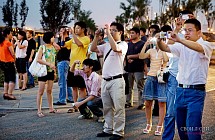China and South Korea have signed a number of documents on bilateral cooperation
Almaty. November 3. Silkroadnews. - On the afternoon of October 31 local time, Premier Li Keqiang held talks at the Blue House in Seoul with President Park Geun-hye of the Republic of Korea (ROK).
Li Keqiang first conveyed President Xi Jinping’s greetings to President Park Geun-hye.
He pointed out that China is willing to make continuous efforts with the ROK to, on the basis of consolidating friendly cooperation, exploit new thoughts, tap new areas and develop new growth points, so as to make still further progress in China-ROK practical cooperation in all areas. First, stick to the general orientation of deepening strategic cooperative partnership, continue to intensify high-level exchanges and dialogues at various levels, officially launch China-ROK negotiations on maritime delimitation at an early date, and reinforce cooperation in response to non-traditional security, law enforcement and disaster relief. Second, dovetail four national development strategies to create new highlights of cooperation. Both sides should strengthen cooperation in innovation, intelligent manufacturing and development and research of high-end technology, boost transformation and upgrading of the two economies, and promote regional connectivity by taking the docking of four pairs of development strategies as opportunities, namely, between China's "Belt and Road" initiative and the ROK's "Eurasia Initiative", between China’s "mass entrepreneurship and innovation" and the ROK's "Creative Economy", between "Made in China 2025" and the ROK's "Manufacturing Innovation 3.0", and between their efforts to explore third-party markets in the international production capacity cooperation, so as to better achieve mutual benefit, win-win results and common development. Third, build two cooperation platforms for youth innovation and entrepreneurship and joint exploration of third-party markets, give play to the leading role of governments to provide better guarantee for bilateral cooperation, and set up China-ROK Innovation and Entrepreneurship Park in Chengdu, China. Fourth, take advantage of the construction of China-ROK Free Trade Area (FTA) to intensify cooperation in economy, trade and finance and coordination in macro-economic policies, and facilitate negotiations of the China-Japan-ROK Trilateral Free Trade Zone (FTZ) and the Regional Comprehensive Economic Partnership (RCEP), so as to promote the process of East Asian economic integration. Fifth, deepen people-to-people and cultural exchanges. Based on the breakthrough of ten million times in bilateral personnel exchanges, both sides will achieve an all-round improvement of the quality and quantity of people-to-people and cultural exchanges, so as to further consolidate the public support for the development of bilateral relations.
Park Geun-hye welcomed Li Keqiang’s first official visit to the ROK after assuming the post of premier, and expressed that currently China-ROK relations are developing smoothly. She has met many times with President Xi Jinping, Premier Li Keqiang as well as other Chinese leaders this year. The close communications between leaders of the two countries are conducive to the development of bilateral relations as well as the peace and stability on the Korean Peninsula and in the Northeast Asia at large.
Park Geun-hye agreed to Li Keqiang’s proposal to further expand and deepen bilateral practical cooperation and people-to-people and cultural exchanges, and to the synergy of the four national strategies. She indicated that the ROK stands ready to strengthen cooperation with China in areas including economy and trade, finance, innovation, manufacturing and medical treatment and health care so as to inject greater impetus into the economic development of the two countries. It is hoped that the two sides will further expand exchanges and cooperation in people-to-people and cultural engagement and accelerate the ratifying process of the ROK-China FTA to bring it into effect at an early date and benefit the two peoples. The ROK holds a positive attitude toward the two countries’ launch of international production capacity cooperation in third-party markets, and is willing to promote this process.
The two sides also exchanged in-depth views on international and regional issues of common concern.
After the talks, leaders of the two countries also witnessed the signing of 17 bilateral cooperative documents in areas including trade and economy, people-to-people and cultural exchanges, science and technology, environmental protection and quality inspection.


